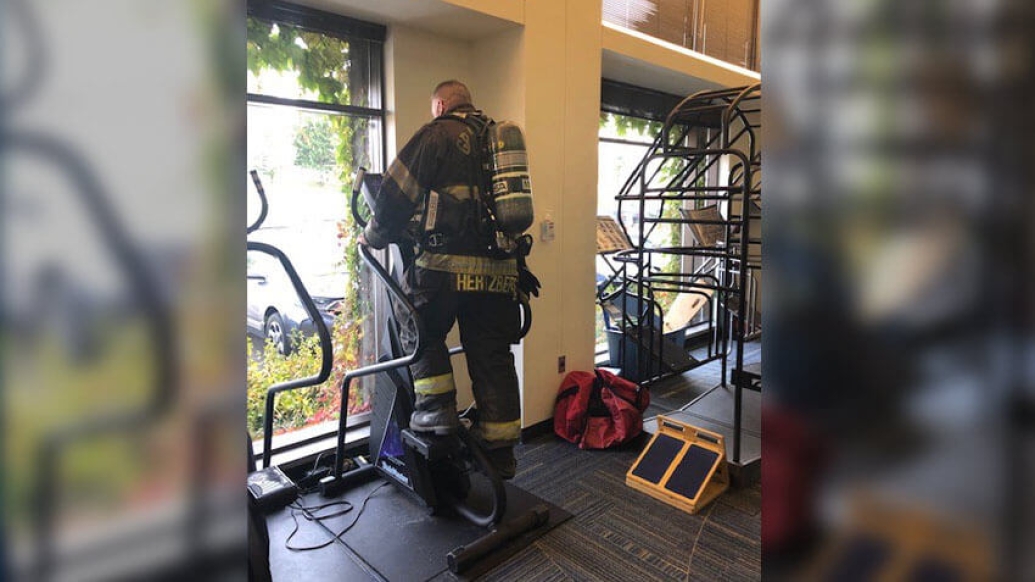A first responder found himself in need of medical care during the initial surges of the pandemic, when his concussion symptoms left him miserable for most of the spring and summer.
5:00 AM
Author |

As he turned 40 last summer, Michael Hertzberg was having trouble remembering his wife and three kids' names
A firefighter who prides himself on being active and mentally sharp, it was frustrating to still feel haunted by a February concussion. Several months after he'd hit his head on a pipe while putting away a fire hose, he was still struggling with focus, dizziness, headaches and frustration. Is this how his life was going to be? How could he continue his active career that requires mental and physical sharpness?
"My wife said she felt like she was living with someone with dementia. I felt like I was at a dead end road, and I knew something had to change because it wasn't an acceptable lifestyle," Hertzberg says.
He'd spent time resting, then doing some lighter-duty work instead of going on fire calls. He thought he'd wait out the symptoms, hoping they'd finally subside, while doctor's offices were busy dealing with the first waves of the COVID-19 pandemic. But he wasn't improving. Instead, Hertzberg was now dealing with the headaches and the dizziness plus the new sleep and mood struggles his symptoms sparked.
Like Podcasts? Add the Michigan Medicine News Break on iTunes or anywhere you listen to podcasts.
"I felt absent in my own being, like I was just going through the motions."
Hertzberg and his dad, who's also his primary care provider, decided to start researching specialists a little further away from his Grand Blanc home to find a clinic that could get him in quickly. They ended up with a same-day appointment offered at Michigan NeuroSport, the sports neurology clinic at Michigan Medicine.
Not accepting a new normal
"He saw us for the first time more than five months after his concussion; then at the next visit, he realized that he actually had more symptoms then he reported at the first visit," says Andrea Almeida, M.D., a sports neurologist and co-director of Michigan NeuroSport.
"I found out my vestibular system is where my issues lied," Hertzberg says. "I hadn't really thought about my balance being off, but it was the balance rather than just lightheadedness that made me have to grab onto things to stabilize myself when I would stand up."
SEE ALSO: 8 Common Misconceptions About Concussions
After a full evaluation, Hertzberg and Almeida came up with a plan for active rehabilitation that would include many of Michigan NeuroSport's experts, including those in neurology, vestibular therapy, spine physical therapy that focused on his neck and more. And while she didn't want him to start weight lifting yet, Almeida encouraged him to use exercise during his recovery with prescribed cardiovascular activity that they determined in the clinic using exercise testing.
"Each session got better and better," he says. "I enjoyed the combination of the medical aspect and the wellness aspect. I wish I wouldn't have waited so long."
Almeida, also an assistant professor of neurology, agrees – she would've loved to meet Hertzberg days, instead of months, after his concussion.
MORE FROM MICHIGAN: Sign up for our weekly newsletter
"If he would've come to us early on, we could've prevented some of the downward spiral that delays recovery and causes distress. The earlier people seek care the quicker they'll recover," she says.
And her team focuses on sports neurology all day, every day, so they're always up-to-date on the latest research and guidelines.
Getting back to 100%
Hertzberg was making a lot of quick progress and itching to get back to going on fire calls with his crew. But before Almeida could feel confident sending her patient back to the fire house, she wanted to make sure he was ready for his high-risk job.
SEE ALSO: What Happens When You Get a Concussion — and What Happens Next
"We had him put on his full firefighting gear and we recreated simulation drills for rookie firefighters in the NeuroSport gym," she says. Hertzberg was doing step ups, pushing sleds and tackling the stair master, all geared up.
He performed well and didn't experience any symptoms during or after the workout, so she cleared him to head back to work.
A nerve block in the fall would be the final trick to kick a lingering headache to the curb.
"For eight months, I didn't have a day without a headache," Hertzberg remembers. "Now I am at 100% again and back on my 24-hour shifts."

Explore a variety of healthcare news & stories by visiting the Health Lab home page for more articles.

Department of Communication at Michigan Medicine
Want top health & research news weekly? Sign up for Health Lab’s newsletters today!





